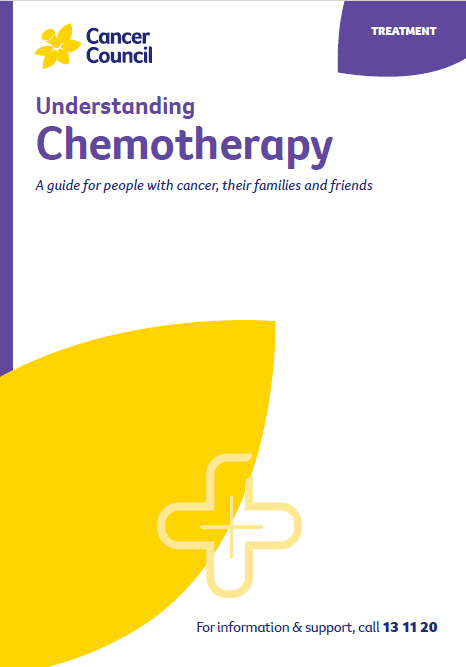- Home
- About Cancer
- Cancer treatment
- Chemotherapy
- Having chemotherapy
Having chemotherapy
Most cancers have treatment protocols that set out which drugs to have, how much and how often. You can find information about protocols for chemotherapy online at eviQ. Your specialist may need to adjust the protocols to suit your individual situation.
Learn more about:
- Overview
- The treatment course
- Complementary therapies and chemotherapy
- Making treatment decisions
- What to expect when having chemotherapy
- Intravenous (IV) chemotherapy
- Other ways of having chemotherapy
- Waiting for chemotherapy
- Is the treatment working?
Overview
You may have treatment with one chemotherapy drug or a combination of several drugs. The chemotherapy drugs given, the dose and the treatment schedule (how often you have the drugs) will be recorded in a treatment plan. You will have tests throughout chemotherapy to monitor your response, and your treatment plan may be adjusted based on the results and any side effects.
Chemotherapy can be given on its own or as part of a treatment plan that could include surgery, radiation therapy or other drug therapies.
The treatment course
How often and for how long you have chemotherapy is known as a treatment course. This will vary depending on the type of cancer you have, the reason for having treatment, the drugs used and how you respond to chemotherapy.
Chemotherapy is commonly given as a period of treatment followed by a break. This is called a cycle. For example, you may have treatment on days 1, 2 and 3, then a break until day 28. Then a new cycle will begin. The length of the cycle depends on the chemotherapy drugs being given. The break between cycles lets your body recover.
If you need more time for your blood count to recover and any side effects to improve, the specialist may decide to delay your next cycle. If you have any concerns about changes to your treatment or any delays, talk to your specialist.
Complementary therapies and chemotherapy
Complementary therapies are sometimes used with conventional medical treatments. They may offer physical, emotional and spiritual support, help manage side effects, and improve quality of life.
Some therapies have been proven to be safe and effective in scientific studies. For example, meditation, relaxation, massage and counselling can reduce anxiety, and acupuncture has been shown to reduce chemotherapy-induced nausea. Some studies suggest acupuncture may also reduce fatigue.
It is important to talk to your doctors about any complementary therapies you are using or thinking about trying, as some can interfere with your treatment or make any side effects worse.
Complementary therapies are different to alternative therapies, which are used instead of conventional medical treatments.
Alternative therapies are unlikely to be scientifically tested and may prevent successful treatment of the cancer. Cancer Council does not recommend the use of alternative therapies.
For more on this see Complementary therapies and listen to our meditation and relaxation podcast.
Smoking may affect treatment and make side effects worse. Try to quit or cut down before starting chemotherapy. Quitting can be hard, especially if you’re feeling anxious about the diagnosis and treatment. For support, talk to your doctor, call the Quitline on 13 QUIT (13 7848) or download the My Quit Buddy app. If you vape or are considering using e-cigarettes to help you cut back on smoking, speak to your doctor first.
→ READ MORE: Making treatment decisions about chemotherapy
Podcast: Making Treatment Decisions
Listen to more episodes from our podcast for people affected by cancer
More resources
A/Prof Kate Mahon, Director of Medical Oncology, Chris O’Brien Lifehouse, NSW; Katherine Bell, Dietetics Department, Liverpool Hospital, NSW; Brigitta Leben, Dietetics Department, Liverpool Hospital, NSW; Sophie Michele, 13 11 20 Consultant, Cancer Council SA; Dr Jess Smith, Medical Oncologist, Macquarie University Hospital, NSW; Karene Stewart, Consumer; Julie Teraci, Clinical Nurse Consultant, Skin Cancer and Melanoma, Cancer Network WA.
View the Cancer Council NSW editorial policy.
View all publications or call 13 11 20 for free printed copies.

